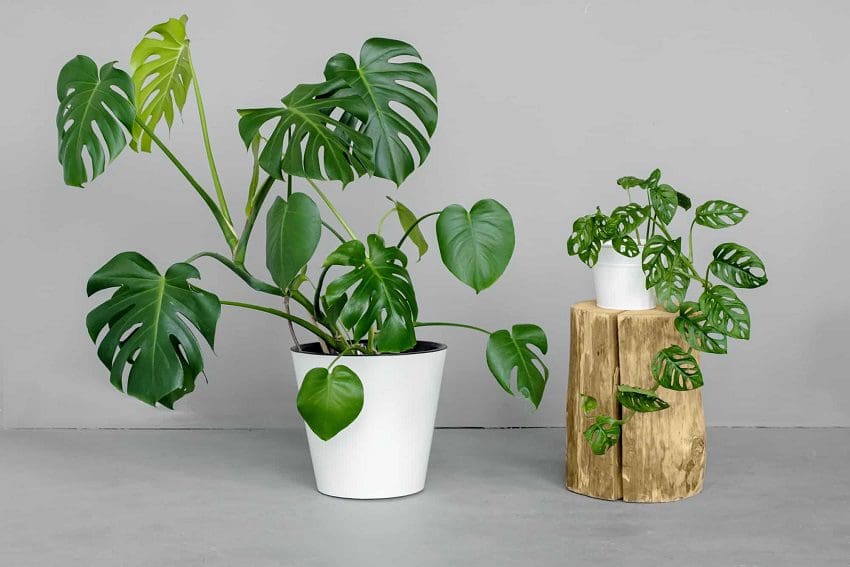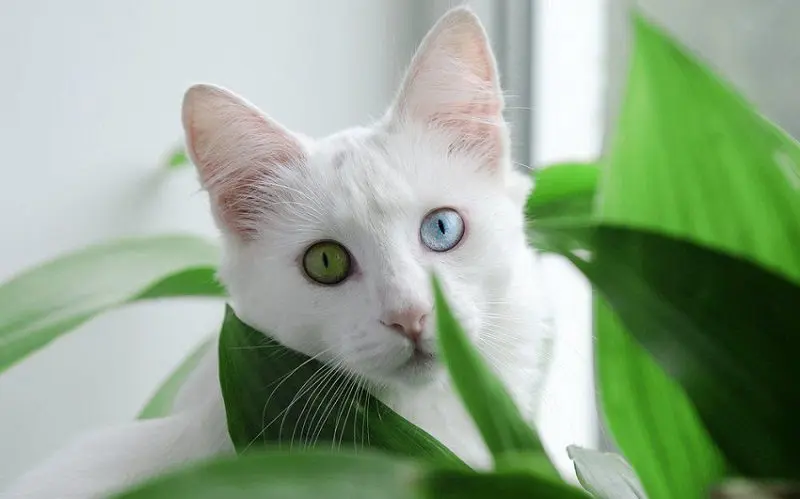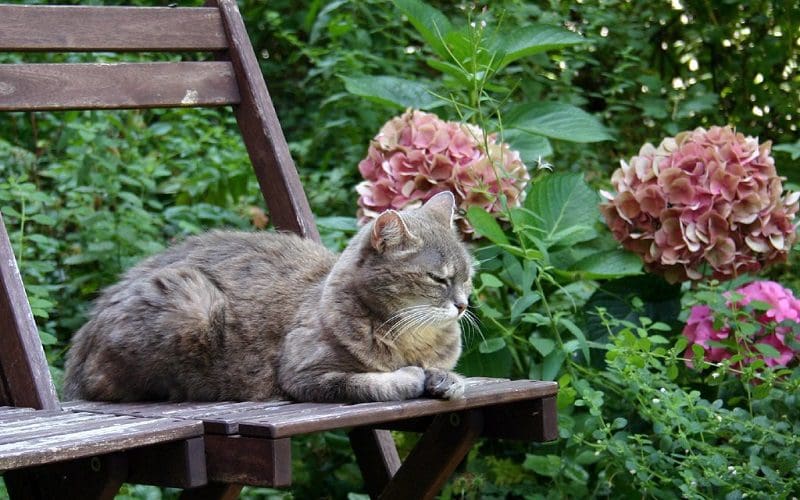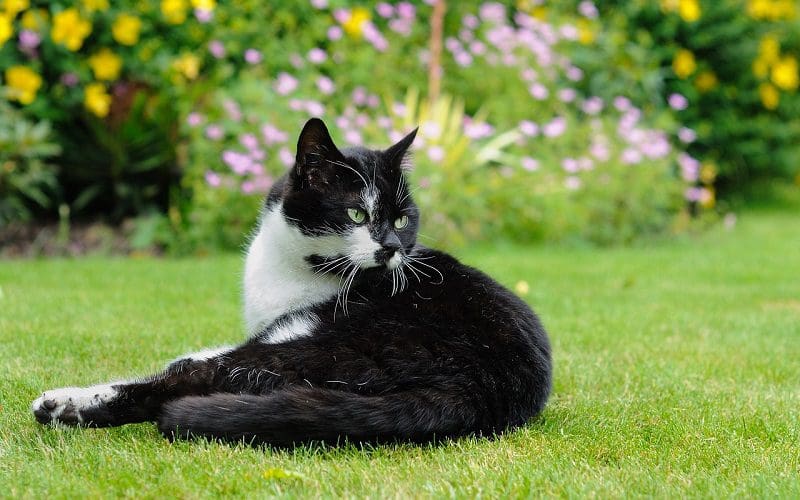Last Updated: 1 year ago
Curled up in your favorite chair with a cup of tea in hand and the bright greens of a monstera plant catching your eye—a perfect moment, right?
But wait! Is your curious feline friend ogling those succulent leaves? Maybe you shouldn’t. This plant is poisonous to your furry friend!
Before we panic, let’s explore the jungle of facts. In this foliage journey, will we uncover the mystery of monstera’s poisonousness to your furry companion?
Let’s dig in and find out the truth about leafy greens and furry friends!
Is Monstera toxic to cats?

Pet owners often wonder about the safety of their indoor jungle animals. One common question has to do with whether cats can eat monstera.
Is this good news? Alas, not really. Monstera is charming with its stylish leaves. But it is a hidden threat to your feline companions.
These contemporary leafy plants are well-liked for their distinct appearance. However, you must keep them out of reach of your cats.
Calcium oxalate crystals can be found in monstera. When cats consume it, it might cause irritation and pain. Symptoms of dangerous plants for cats can include drooling, vomiting, and difficulty swallowing.
In severe cases, it can lead to swelling and inflammation of the mouth, tongue, and throat. Do you suspect that your cat has ingested monstera?
Or have you noticed any of these symptoms? You should contact your veterinarian immediately. Responsible pet owners recommend monitoring how your cat interacts with plants, including your favorite monstera.
Create a safe environment for your feline friend. Then, leafy greens and furry companions can coexist harmoniously in your home.
Always be cautious about introducing new plants into your home. First, make sure they are not harmful to your favorite feline companions.
Introducing pet-safe plants regularly is a simple but effective way to make your home healthy and happy for your cat.
What does Monstera do to cats?

Your home is your sanctuary, adorned with greenery and the delightful presence of your feline friend.
The Monstera plant stands out among the indoor jungle with its iconic divided leaves. But the question arises about the interaction between Monstera and cats.
Let’s understand the intricacies of this leafy companion and its interaction with your curious pet:
- Toxicity: The news is that monstera plants are generally considered quite toxic to cats. In most cases, accidental exposure to these lush leaves will result in consequences. And often, those consequences are not pleasant.
- Gastrointestinal upset: Monstera is a hidden threat. And you need to be aware of possible mild reactions. There are often side effects after monstera. Ingestion of monstera leaves can cause gastrointestinal upset in some cats. Symptoms like vomiting or diarrhea are frequently present with it. Such reactions require a trip to the veterinarian.
- Individual variations: Cats, like humans, can have individual differences in sensitivity to certain substances. Some cats may have more sensitive stomachs or allergies. It makes them more prone to mild reactions. Observing your cat’s behavior will help you determine their unique reactions.
- Moderation is key: Often, a cat will have mild reactions, but moderation is essential. Have you noticed that your cat is showing excessive interest in monstera? Consider a different placement for this dangerous plant for cats. Explore alternatives to ensure both green décor and your cat’s well-being.
- Veterinarian consultation: You should consult a veterinarian after coming into contact with a monstera. Professional advice can be reassuring. They can make recommendations tailored to your cat’s specific needs.
A cat can have side effects after monstera. It is essential to understand the possible impact and take proactive measures.
It can ensure the harmonious coexistence of your four-legged friend and leafy companion. With some care, your home and your pets will thrive in green splendor.
What to Do If Your Cat Bites a Monster

Imagine this: Your curious cat bites your monstera plant. Of course, you might immediately panic and wonder if monstera plants are toxic to cats.
As we said, monstera plants are toxic to cats. And it’s important to know what to do if your feline friend decides to eat the leaves.
Let’s take a look at some steps. They will ensure the well-being of both your cat and your green companion.
- Remain calm: First and foremost, stay calm. You may be alarmed that your cat has bitten a monstera. But panicking won’t help. Take a deep breath and approach the situation with a calm mind.
- Check for immediate distress: Examine the cat for immediate signs of distress. The cat looks normal and is not showing any immediate adverse reactions. That’s good! Mild reactions, if any, often manifest as gastrointestinal distress.
- Observe behavior: After asking if cats can eat monstera, monitor the cat’s behavior for several hours. The plant is poisonous, so look for any unusual signs. Most cats do not have serious problems, but vigilance is essential.
- Keep an eye on your eating and drinking habits: Pay attention to how your cat eats and drinks. Make sure they continue to eat and drink water as usual.
- Eliminate access to the monstera: Monstera and cats are incompatible. To prevent the situation from happening again, change monstera’s location. Place it in an area less accessible to the cat, or use deterrents.
- Consult your veterinarian: Are you experiencing persistent or worsening symptoms? Or are you unsure about your cat’s well-being? Then, consult a veterinarian. Professional advice will help put your mind at ease and make recommendations tailored to your situation.
Remember that accidental nibbling of monstera leaves is often problematic. But if you are proactive and observant, it will ensure the health and happiness of your feline friend.
Be aware and careful. Then, monstera and cats can coexist harmoniously in your indoor oasis.
Could Monstera Toxins Kill Your Cat?

Of course, when the question arises, Are monstera toxic to cats?, you want to know about the lethal outcome.
Fear not! Monstera plants are generally not fatal to your cat. Yes, they contain substances that may cause mild irritation when ingested.
But fatalities are extremely rare. Monstera toxins are generally considered low-risk for cats. Most feline friends can coexist with these stylish green companions.
If your cat accidentally takes a bite, you may observe mild side effects after monstera. Fortunately, these reactions are usually temporary.
However, it is crucial to consider the individual characteristics of cats. Some cats may have a more sensitive stomach. Have you noticed persistent or severe symptoms? Then, it is worth consulting a veterinarian.
In most cases, Monstera plants do not severely threaten your cat’s life. However, it’s always worth creating a safe environment. Or you can provide alternative greens for curious nibbling.
Overall, Monstera toxins are not fatal to cats. But be vigilant and follow preventative measures. It can ensure the continued well-being of both your green décor and your favorite feline companion.
How to Keep Both Monstera and Cats Safe in the Same House

Do you want to ensure the harmonious coexistence of this dangerous plant with cats? Then, it is necessary to carefully consider everything.
Here are some simple tips to keep both the greenery and your feline friend safe:
- Strategic placement: Choose elevated locations or hanging planters for monstera. Cats love to explore, and placing the plant in hard-to-reach places reduces the temptation for curious nibbling.
- Cat-friendly greenery: To satisfy your pet’s instinct to chew, offer alternative plants. Catnip or cat grass are great options. They will allow for a safe and enjoyable distraction with greens.
- Repellent: Think cats can eat monstera? Not if you use safe deterrents. You can apply a bitter-flavored spray or natural repellents to the leaves. These will make them less attractive to curious cats.
- Monitor behavior: Monitor your cat’s behavior around Monstera. Will you notice excessive interest or attempts to chew on the leaves? Then, it may be time to reconsider the plant’s location or explore additional deterrent methods.
- Training and distraction: Train your cat to associate the monstera with a restricted area. Use positive reinforcement by encouraging her to avoid the plant. Also, offer your cat engaging toys and playtime to distract her attention.
- Safe plant choices: Want to avoid side effects after monstera? Then, choose indoor plants that are non-toxic to cats. This way, you can expand your indoor garden. And you don’t have to worry about potential risks.
- Consult your veterinarian: Do you have concerns about specific plants or your cat’s behavior? Consult your veterinarian. They can provide personalized advice based on your cat’s health and habits.
By following these tips, you can create a living space where your monstera can thrive and your cat can live safely.
With some planning and attention, your greenery and feline friend can enjoy a happy and healthy coexistence.
Conclusion
When thinking about monstera that are toxic to cats, the key is balance. Raise the plant, provide cat-approved greenery, and stay vigilant.
Strategic placement and vigilant observation will allow you to create a haven. Then, monstera and your cat will coexist happily, making your home a sanctuary for all.
What is your experience with cats and monstera plants? Please share in the comments section below.
